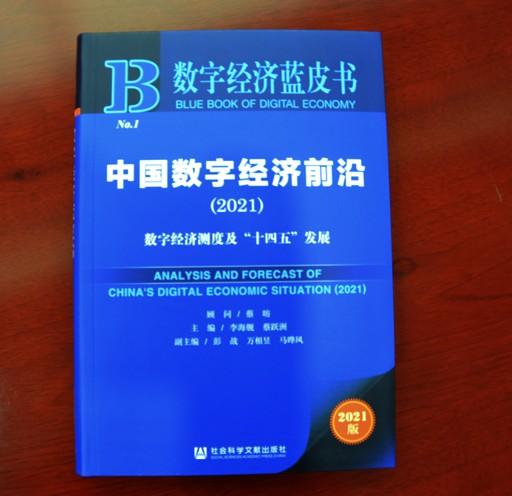


The Blue Book Photo: Sun Meijuan/CSST
Analysis and Forecast of China’s Digital Economic Situation (2021), the first Blue Book on digital economy by the Chinese Academy of Social Sciences (CASS), was released at a seminar in Beijing on May 14.
Cutting-edge analysis
The Blue Book analyzes the current digital economy, and predicts its overall development during the 14th Five-Year Plan (2021–2025) period, said Wang Limin, president of the Social Sciences Academic Press, publisher of the Blue Book. The book studies development of the digital economy, digital economy governance, digital economy security, digitization, and the relationship between digitization and globalization.
Standing at the frontier of contemporary Chinese digital economic research, the Blue Book provides a comprehensive and valuable reference for academia, industry leaders, and decision-making departments to interpret the digital economy, Wang noted.
The Blue Book calculates the scale of China’s digital economy over the past few years, based on calculations of the added value of digital sectors and calculations of digital technology’s contributions to the added value of other sectors.
The results show that in 2020, the scale of China’s digital economy exceeded RMB 19 trillion, accounting for about 18.8% of the country’s GDP.
In his preface to the Blue Book, CASS Member Cai Fang wrote that the vast majority of the people have shared the fruits of scientific and technological progress and productivity improvement, as China’s reform and opening up has adhered to people-centered development. The concept of shared development, one of China’s new development concepts, has also abandoned the illusory assumptions of trickle-down economics.
“Like all disruptive technological revolutions in history, the development of the digital economy cannot automatically solve the problem of widespread sharing. It can also produce a series of problems such as hindering innovation, inhibiting sharing, and widening the gap,” Cai wrote.
At the seminar, Cai explained the impacts of digital technology and the digital economy on China’s economic and social development, employment, and international competition.
Future development
Future research on the digital economy should not only pay attention to how the digital economy promotes economic and social development, but also the risks and challenges its development faces, said Wang Tongsan, CASS Member and the Blue Book’s academic consultant.
During the 14th Five-Year Plan period, the acceleration of the manufacturing industry’s digital transformation and the development of the industrial internet will bring about great changes, said Cai Yuezhou, director of the Digital Economy Research Office under the Institute of Quantitative and Technological Economics at CASS.
As digital technology increasingly penetrates into traditional industries, there will be huge room for industrial digital growth. In addition, the development of industrial digitalization will drive the rapid growth of industrial software, industrial apps, and ICT service industries, such as information technology and software services. It may also give birth to new digital sectors.
According to the Blue Book, new forms of employment are emerging as China’s digital economy continues to accelerate in the new era. The rising scale of employment in the digital economy sector and the trend of job category diversification have driven a gradual increase in ICT employment and economic benefits. At the same time, they have also put forward new requirements for human capital and skills.
Cai Fang said that digital economy research needs to incorporate more humanistic perspectives.
“We need to especially think about how to ensure the inclusive development of the digital economy and achieve high-quality employment. It is important to bring laborers that have been replaced into a new stage of high-quality development to ensure the healthy development of our country’s digital economy in the long term,” Cai Fang said.
At present and for a long time to come, the human capital structure still faces problems such as a shortage of high-end talent, a shortage of professional skilled talent, and the polarization of demand, according to the Blue Book.
During the 14th Five-Year Plan period, for China to improve its human capital, it needs to focus on improving education and training, and to deepen skill investigation and monitoring. Cooperation between higher education institutions and enterprises also needs to be deepened, the Blue Book suggests.